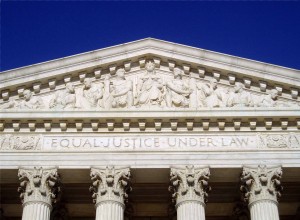 Religious liberty is at the heart of our country. It is what has enabled countless people from all walks of life and from all religious and non-religious persuasions to be free and safe in America from persecution for their beliefs. It is why those fleeing the oppression of religious coercion in other countries seek out our shores for asylum and protection. It is a bedrock foundation stone of the United States. The Supreme Court in its recent 5-4 decision in Burwell v. Hobby Lobby is a step backwards for religious liberty and here’s why:
Religious liberty is at the heart of our country. It is what has enabled countless people from all walks of life and from all religious and non-religious persuasions to be free and safe in America from persecution for their beliefs. It is why those fleeing the oppression of religious coercion in other countries seek out our shores for asylum and protection. It is a bedrock foundation stone of the United States. The Supreme Court in its recent 5-4 decision in Burwell v. Hobby Lobby is a step backwards for religious liberty and here’s why:
Hobby Lobby and Conestega Wood Specialties sued the Department of Health and Human Services on the grounds that the requirement to provide health insurance that includes contraception to their employees violated their religious liberty. As Christians who believe that life begins at conception being required to provide coverage with contraception was tantamount to condoning the murder of innocents, they argued in their lawsuit. The Supreme Court agreed with these two companies. This decision has tremendous ramifications in two ways. First, it puts preference for the employer in their religious convictions over that of the employee. In offering health insurance with multiple options, including multiple contraception options, it lays the decision for healthcare at the discretion of the one receiving the healthcare. In removing the option of contraception from the healthcare plans it preempts the decision of the individual healthcare recipient and makes the decision for them. The court decision argues that the passive enabling of a possible choice is more egregious from the perspective of religious liberty than is the removal of a choice from an individual.
Second, the decision makes it possible for further actions by inherently non-religious institutions, such as other arts and crafts stores or barbers or restaurants, to curtail other acts of agency by their employees or other discriminatory actions in the name of the owners religious liberty. For example, a business owned by Christian Scientists might argue they ought not be required to provide healthcare at all or a restaurant owned by Christian White Supremacists could argue it is against their religious beliefs to serve people of color. Just recently Arizona almost made the law of the land the ability to refuse service to homosexuals on account of religious beliefs, if not for the veto by Governor Jan Brewer. That law, if enacted, would most likely have made its way up to the Supreme Court and possibly could have been upheld utilizing similar reasoning in Burwell v. Hobby Lobby. This point is indeed brought to attention in the dissenting opinion offered by Justices Ginsburg, Sotomayor, Breyer and Kagan.
The justices in their majority opinion state that even though one could see the extensions of this decision to other acts of discrimination or the curtailing of employee autonomy this will not happen. Why will it not happen? The justices do not provide compelling rationale for that notion and simply ask us to believe them.
It does not take much of an imagination to conceive of all the myriad possibilities that this decision opens up. It significantly challenges the ability of employees with religious or non-religious beliefs not held by their employer to continue working in their place of employment and maintain their religious liberty. It significantly challenges the notion that people ought not be discriminated against in the public square. Any act of discrimination can be justified on the grounds of religious conviction. Any restrictions imposed upon employees and a limiting of their agency can be justified on the grounds of religious conviction.
Those of us who hold deeply and cherish the religious freedoms that are a fundamental part of America should be concerned about this Supreme Court decision. Those of us who are members of religious minorities with a history of being persecuted and oppressed should be concerned about this decision. In the name of religious liberty that very liberty experienced a setback and we all ought to be concerned.












